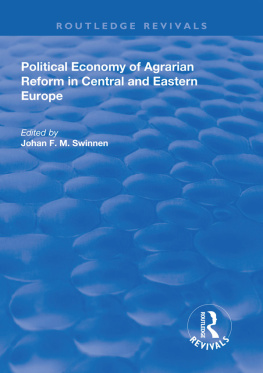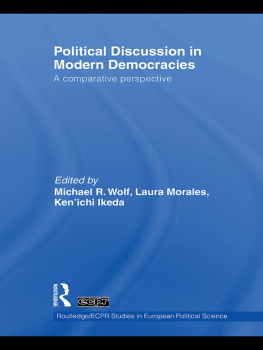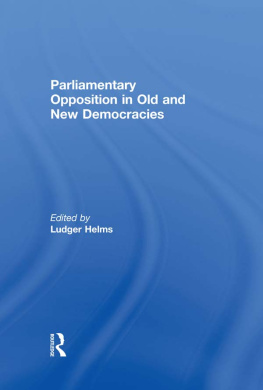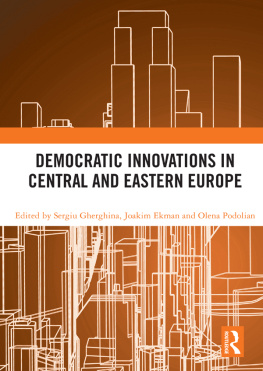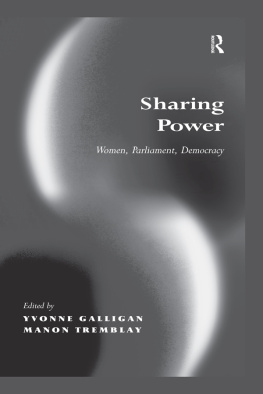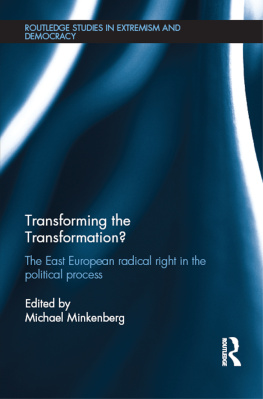BEYOND POST-COMMUNIST STUDIES
BEYOND POST-COMMUNIST STUDIES
Political Science and the New Democracies of Europe
TERRY D. CLARK
First published 2002 by M.E. Sharpe
Published 2015 by Routledge
2 Park Square, Milton Park, Abingdon, Oxon OX14 4RN
711 Third Avenue, New York, NY 10017, USA
Routledge is an imprint of the Taylor & Francis Group, an informa business
Copyright 2002 Taylor & Francis. All rights reserved.
No part of this book may be reprinted or reproduced or utilised in any form or by any electronic, mechanical, or other means, now known or hereafter invented, including photocopying and recording, or in any information storage or retrieval system, without permission in writing from the publishers.
Notices
No responsibility is assumed by the publisher for any injury and/or damage to persons or property as a matter of products liability, negligence or otherwise, or from any use of operation of any methods, products, instructions or ideas contained in the material herein.
Practitioners and researchers must always rely on their own experience and knowledge in evaluating and using any information, methods, compounds, or experiments described herein. In using such information or methods they should be mindful of their own safety and the safety of others, including parties for whom they have a professional responsibility.
Product or corporate names may be trademarks or registered trademarks, and are used only for identification and explanation without intent to infringe.
Library of Congress Cataloging-in-Publication Data
Clark, Terry D.
Beyond post-communist studies : political science and the new democracies of Europe / by Terry D. Clark.
p. cm.
Includes bibliographical references and index.
ISBN 0-7656-0980-0 (alk. paper) ISBN 0-7656-0981-9 (pbk. : alk. paper)
1. Democracy. 2. Democratization. 3. Post-communism. 4. Europe, Eastern--Politics and government--1989 5. Europe, Eastern--Research. 6. Political science--Study and teaching. I. Title.
JC423.C584 2002
320.947--dc21 2002020622
ISBN 13:9780765609816 (pbk)
ISBN 13:9780765609809 (hbk)
Contents
List of Tables and Figures
Figures
Tables
It has been my good fortune that my academic career began on the eve of the collapse of communism in eastern and east-central Europe. I, along with my colleagues, have had the privilege of studying the profound social, economic, and political challenges that have attended that collapse. In contrast to those who labored before us, we have had access to rich repositories of data of all types and descriptions, as a consequence of which we have been able to pursue a greater universe of questions. Nonetheless, despite both the energy and excitement that all of this has generated, I must confess to one frustration. Almost ten years after the collapse, we still do not have adequate theories capable of guiding research in many major areas of concern.
Perhaps the fact that I received my Ph.D. in political science from the University of Illinois at Urbana-Champaign helps explain why I am even concerned about theory. I remain grateful to the excellent faculty at that institution, who challenged me to think theoretically. However, to be honest, I have not always been convinced of the utility of models and the like. In fact, in my early years as a scholar I was deeply committed to an area studies approach, focusing on the richness of context. At best, I was ambivalent to the claims of political scientists, such as Alexander J. Motyl that theory is central to the research enterprise, finding myself decidedly more at ease with attempts to expand our substantive knowledge of the region.
My conversion, if that is the proper word, occurred over an extended period of time during which I grappled with the reform process in Russia and Lithuania, the two countries for which I was best prepared to conduct research. To my mind, history and culture failed to adequately address why the latter was experiencing far greater difficulties, particularly in its efforts to create a democratic state. Equally disconcerting was the overly optimistic literature on Russian public attitudes and institutions, a literature with which I found myself in profound disagreement. (The literature became decidedly less sanguine following the ruble collapse of 1998. However, well into the mid-1990s, it was difficult to find a journal willing to publish articles expressing any degree of skepticism about the Russian democratization process.) I slowly came to the conclusion that the underlying problem with much of this work was that it was explicitly idiosyncratic and contextual and therefore not comparative. Hence, all institutions were judged democratic as long as they conformed in form, but not necessarily content, to those in other political systems.
I ultimately became convinced that the meaning of democracy and democratic institutions could not be contextually dependent. If such phenomena are unique to every political system, then they are useless categories. One can simply declare that all political systems are ultimately democratic and that all political institutions perform democratic functions as long as they conform to the meanings of those concepts as imbedded in the particularities of the given culture. Theory presented itself as the way out of this morass by providing a common set of concepts, categories, and linkages. I have come to the conclusion that theory is equally important for other reasons as well. Without it I am at a loss to understand how we might compare cases by juxtaposing what has been discovered elsewhereas represented in the theoretical constructs that are informed by that knowledgewith the facts in the particular case before us. Indeed, absent this process we are forced to rediscover the wheel each time we engage in research. Worse, we can not enter into the exchange of ideas and information that permits any degree of accumulation of knowledge. And perhaps most important, we can not truly know the answer to the question why? In short, aside from theory, I am not sure how one goes about making progress in expanding our substantive knowledge. None of this, however, argues that we should naively employ theories without regard for context. That would permit the accumulation of neither substantive nor theoretical knowledge.
The best-developed project addressing the issue of democracy theoretically is democratic consolidation. Not surprisingly, given the fields area studies tradition, the response to the application of the theory in post-communist studiescritique of the theory that permits them to engage political science as a discipline.
I have concluded that the better approach is to engage in research efforts to revise shortcomings and oversights in democratic consolidation theory. That is one of the purposes of this book. In the first two chapters I review the research on democratic consolidation in post-communist Europe. In the third chapter I consider the issues that we are not adequately addressing. In the fourth chapter I put forward a proposal for tightening the theoretical linkages in democratic consolidation, a proposal that is predicated on a rational-choice definition of a consolidated democracy.
A second and related purpose of this book is to demonstrate how rational-choice approaches can be meaningfully applied to analyzing political processes in some of the democracies of post-communist Europe. A small but significant number of states in the region are already consolidated democracies. These states provide an excellent test bed for rational-choice theories. In I use selected examples drawn from Lithuania to demonstrate the utility of these theories. The book, however, is not about Lithuania. It is about moving beyond the set of theoretical tools currently employed to analyze political processes in post-communist Europe.


